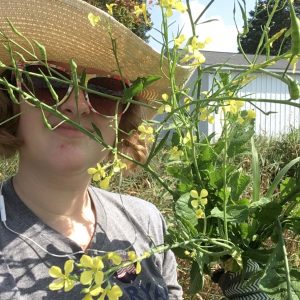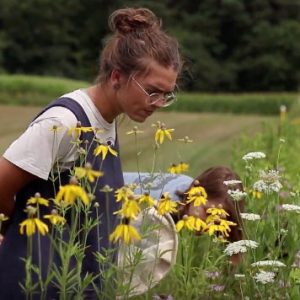Each year we have science-focused graduate students complete fellowships in outreach and science education. The KBS Science Education Fellows coordinate the K-12 Partnership workshops, plan and assist with field trips on a variety of topics at KBS, on MSU’s main campus and within our community and local K-12 schools. This opportunity is funded by MSU’s Graduate School.
For the 2019-20 academic year, Ava Garrison and Lindsey Kemmerling are the KBS Science Education Fellows. Let’s learn more about them and their areas of research!
Lindsey Kemmerling
I am a Ph.D. student in the Haddad Lab at KBS studying biodiversity conservation and sustainable agriculture. My research occurs in the Long Term Ecological Research (LTER) site at KBS. I study how biodiversity and ecosystem services change across a land use gradient ranging from conventional farming to deciduous forest. This work includes measuring decomposition by dung beetles, pollination services, and the biodiversity of spiders, butterflies, and flowers.
I am interested in outreach focused on nature, global environmental change, and environmental justice. I hope to establish relationships with different organizations and assume an active role in the community related to outreach and environmental activism. While the outreach program at KBS has established relationships with K-12 teachers and other organizations, I would like to broaden this scope by engaging with community groups in Kalamazoo. I am interested in developing the skills needed for organizing and leading community events and increasing my science communication skills. I am eager to continue to work towards a sustainable and just society as a graduate student, as an outreach fellow, and as a community member.
Ava Garrison
Agriculture is vital to support our growing world population, but weeds cost us billions of dollars every year due to yield loss and herbicide use. Farmers use many methods to control weeds and their damaging effects on crops, but unfortunately weeds are nearly impossible to get rid of completely once they have established in agricultural fields. This is because weeds are able to adapt to the conditions in the field very quickly and end up competing with the wanted crops for space and nutrients. In order to better control weeds, we must understand how they are able to adapt so well, but currently little is known about the genetic processes that lead to adaptation.
I am a Ph.D. candidate in the Conner lab at the KBS. My research focuses on the initial evolution of an agricultural weed, weedy radish (Raphanus raphanistrum), to crop fields. Weedy radish is a great organism for studying weed evolution for two reasons: first, it is one of the world’s worst crop weeds so it is well-adapted to agricultural fields; and second, it is closely related to non-weedy (native) radish, so by studying the differences between these two plant types, we can begin to understand the genetic processes that occurred in the evolution of weedy radish. Ultimately, insight into the evolution of weedy radish will hopefully tell us more about how weeds adapt generally and enable us to control them, ensuring suitable crop yields for the growing population.
I’m very excited to be a Science Education and Outreach Fellow this year! Communication is one of the most important skills a scientist can have, and I look forward to honing this skill by working in classrooms with students of different ages and backgrounds. It’s also very important to me to show young scientists how many options are available to them as they begin to think about their future lives!
Twitter: @Rad_ishLady


A legacy of conservation; a commitment to sustainability.
3700 E. Gull Lake Drive
Hickory Corners, MI 49060
(269) 671-5117
info@kbs.msu.edu